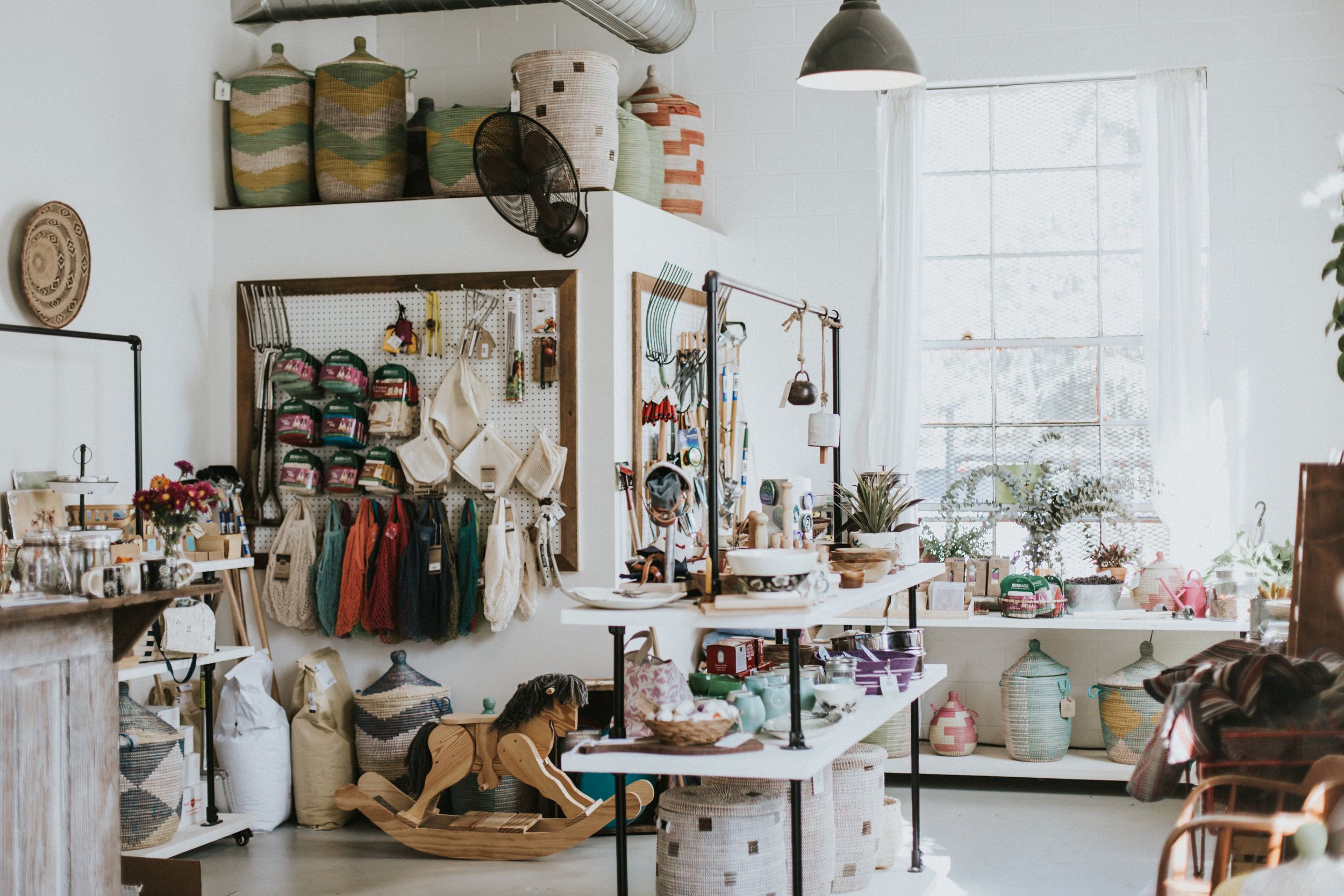“They rode up on a bicycle,” Kate Van Cantfort recalls of one of the early days of Lotta Mae’s Supply Co.
It was a late summer day when Oscar Clarke and Casey Magner happened upon the newly opened farm, garden and home shop. Not minutes after they peeked into the small store, they proudly returned with some of “the most engineered, highest quality goods” Kate had ever seen. The professional team mechanic cyclists and childhood friends had been handcrafting practical, durable bags and packs under the moniker Magner Co. during their off-season.
“You think you can sell them?” they asked. “I think you can’t stop me from selling them,” Kate replied.
Kate grew up in Milledgeville, Georgia, raised by parents who owned small market radio stations in Jesup, LaGrange, McRae, Gordon and Milledgeville.
“Their whole business was about the success of other small businesses, so I’ve always been small business minded,” said Kate.
Lotta Mae’s Supply Co. reflects this attitude in every hand-selected item displayed on shelves built by the hands of one in-town carpenter. On day one, Kate opened her doors to a line that lasted five hours to visit a shop stocked and designed with just local inventory.
This is Kate’s definition of community development – harness the multiplier effect made possible by supporting the local producers and thereby the local economy. “It’s been part and parcel to my life’s work,” she said.
Proudly, Kate already stocks three makers’ goods who have never had placement in a shop before. She’s coached them and helped encourage their brands. It’s only the beginning. The quality of the product is non-negotiable and the story of the maker, just as crucial.
The medley of goods that fill Lotta Mae’s all have that in common, that and the necessity of purpose. An axe is a tool, and if she’s going to sell a clutch, it better be durable enough to be tossed around a dirty truck bed next to a bag of feed.
Kate is a strong, confident woman. She drives a big pick-up truck. She doesn’t hesitate to tell it like it is, or like she sees it. Years of activism wouldn’t allow it. Her tall stature commands attention, and her life’s many turns along the way all somehow led to the space she has created in the semi-industrial corridor alongside the railroad tracks of Barber Street in Athens, Georgia.
In one of the first photographs of Kate as a baby, you’ll find her wrapped in a carrier with her mother protesting the landfill in Gordon, Georgia leaking into the water supply. At a young age, Kate’s father sent her to record the news at the city council meetings.
“This is what happens when you do this with a child, when you force civic-mindedness at a young age,” Kate said. She grew up with the powerful feeling that she too could press on the levers of change.
In her 20’s and early 30’s, Kate bounced between gut-wrenching social work and quests of personal integrity. She ran a shelter until she couldn’t any longer, then lived in a cabin in Moose, Wyoming with no utilities. She worked for an anti-poverty and homeless organization in Colorado, then went off-grid on top of a mountain in New Mexico doing environmental work.
Through her first marriage, Kate found herself in Kansas. Despite feeling suffocated in the heart of Monsanto, she quickly gained a following as an informal greening guru, a lovingly nicknamed plastics conspiracy freak. In her husband's big agriculture machine manufacturing building, she found her space on Saturday mornings, having carved out a section in the front aisles to sell organic seeds and starts, gloves and magazines for farm wives, and coffee with muffins to be enjoyed while reminiscing on farming life long past.
“These are crusty ass Kansas farmers, old guys. They would come in and look at stuff. The first few times they wouldn’t say much, just seeing what this Georgia lady was doing,” Kate remembered fondly. “Then they would sit and talk, and it was all memories of what their grandma had grown. They had me tracking down these seriously old fashioned cucumbers and melons.”
Kate was always the one asking what now, and developing community always resurfaced as her way of making an impact.
In 2004, back in Athens upon her mother’s request, Kate bought one of the first new construction homes on Peter and Arch Street, in the heart of the historically poor black “Iron Triangle”. Encouraged instead of scared by the old southern gentleman who warned her of the purchase, she was the second white person living on the block. A self-proclaimed companion gardener, Kate welcomed the afternoons when she would garden and tell stories with the widowed black women who had occupied that neighborhood forever.
“All this time [in social work] I’d been a gardener on the side. I’ve been calling it a farmender – bigger than a garden, smaller than a farm,” she said.
In 2017, Kate finds herself again in a transitional neighborhood, wedged between a hipster coffee shop and a family shelter, with a chance to lovingly engage with her community and hopefully challenge barriers to diversity of race, age, income and lifestyle along the way.
“The first time you do something different it’s the hardest, and its easier every time after that. If the first time you go in here…and it’s not the perceived notion that its difficult, maybe we’ll make some change happen,” she said.
Before deciding on this space for Lotta Mae’s Supply Co., Kate literally backed her truck in. She did her homework. She researched. Kate Van Cantfort is thorough. While staying true to her vision, a vision she’d been cooking for years, she wants Lotta Mae’s to tap into what this community needs from it too.
“If [my customers] couldn’t pull in a dually to throw in 50 pounds of feed then I wasn't going to have that kind of clientele,” she said. “They needed to feel comfortable driving their truck down the road to get where I was.”
With Kate, the sky is the limit. She is constantly dreaming as she walks through her small, bright square footage, imaging more from classes and workshops, to community meetings, to bee-keeping out back, a tool co-op and maybe even a chicken hotel.
“I want to have functional items that are high quality, that are not for luxury. I balk at [the idea that] only people with certain income have the right to have quality items.”
The brilliant aesthetic of Lotta Mae’s Supply Co. may be accidental according to Kate Van Cantfort, but the positive consequences of one woman’s “second child” will all be intentional.
Words by Erin Wilson
Photographs by Paige French





